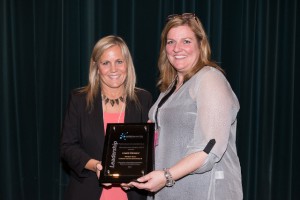 About the author: Laurie Clement, teacher at Windsor-Essex Catholic District School Board, Google Education Trainer, Google Certified Teacher, and ORION 2014 Leadership Award Winner.
About the author: Laurie Clement, teacher at Windsor-Essex Catholic District School Board, Google Education Trainer, Google Certified Teacher, and ORION 2014 Leadership Award Winner.
As I watched the recent BMV Superbowl commercial featuring a 1994 video clip of Katie Couric and Bryant Gumbel trying to figure out this “Internet thing,” I had to laugh. We are so entrenched in technology today that it seems impossible to imagine how we survived without it. As I thought about this, I found it equally intriguing to consider what students will be doing 20 years from today–things that we can’t even imagine, will become their norm.
“It was instantly obvious to me that connecting globally was an experience that impacted my students in a way I could not.”
Skyping brings borderless learning
Without a doubt, the ability to connect globally has been the “Aha!” moment of my teaching career. I am not sure there are words to truly express the amazement I feel as I watch my students communicate, collaborate and think critically with peers across the world. Our global connections have transformed from one-time meetings into true collaborative projects. Looking back over the past two years, I will never forget the excitement and anticipation of our first global Skype call.
My students and I were buzzing around trying to find the best set-up to fit our entire class within view of the little camera, as we connected with a class from Balatonboglár, Hungary. It seemed surreal that we were actually meeting them face-to-face in this digital environment. That year, we enjoyed many Mystery Skype sessions in which we tried to guess where global classes were located, by asking yes/no questions to determine their geography and learning about international students’ countries, cultures and classes. It was instantly obvious to me that connecting globally was an experience that impacted my students in a way I could not.
Taking it to the next level
At that point, I began planning more collaborative projects to engage students globally. Along with a colleague in Brazil, Mark Engstrom, we created a site called Global Students Global Perspectives. On this site, students designed collaborative global projects: students tackle what they feel are global issues and work together to provide solutions they can immediately embrace in their lives, as well as things they would like to see improved on a global level. There is a definite sense of empowerment I see as students engage in real world discussions with peers around the globe.
The unexpected principal’s call
Fast-forward to a year ago, when my principal called me down to congratulate me on winning the ORION K12 Leadership Award. As a grade-eight teacher, I was truly amazed and honoured as I had no idea I had been nominated. The more I read about past recipients and the innovative approach that ORION takes toward each one of their initiatives, I was humbled and excited to attend the 2014 THINK conference. I knew it was going to inspire me to continue to push the boundaries for change, and truly embrace all that technology has to offer myself and my students.
When students become knowledge curators
I am currently in my second year of teaching in a 1:1 Chromebook. The opportunity to access the Internet all day has completely transformed me as a teacher. Learning is no longer limited to textbooks or the materials I can present within our classroom walls. With unlimited resources at our fingertips, my focus is to teach my students to become curators of knowledge and to efficiently and effectively communicate in our digital world.
The Chromebooks have provided a user-friendly collaboration tool, which has allowed my students to explore, share, engage, and connect with peers and myself in meaningful ways. Using MyTools2Go, the Windsor-Essex Catholic District School Board’s version of Google Apps For Education, we begin every assignment by creating a shared Google Document, Drawing or Slide. As a free, cloud-based application, MyTools2Go offers the ability to complete assignments online and provide ongoing feedback and targeted instruction. I am able to use the revision history feature to identify the specific strengths and weaknesses of each individual student. In that sense, Chromebooks are also a practical tool for differentiation, as it allows me to meet the needs of each individual student.
Students are connecting with peers, discussing global issues, meeting curriculum expectations and gaining a perspective that can only be achieved from these personal connections. Without a doubt, our students have the world at their fingertips. It is a very exciting time to be an educator!
If Laurie’s story reminds you of someone who has made a difference in the realm of research, education and innovation, nominate that person for an ORION Leadership Award before March 1.


